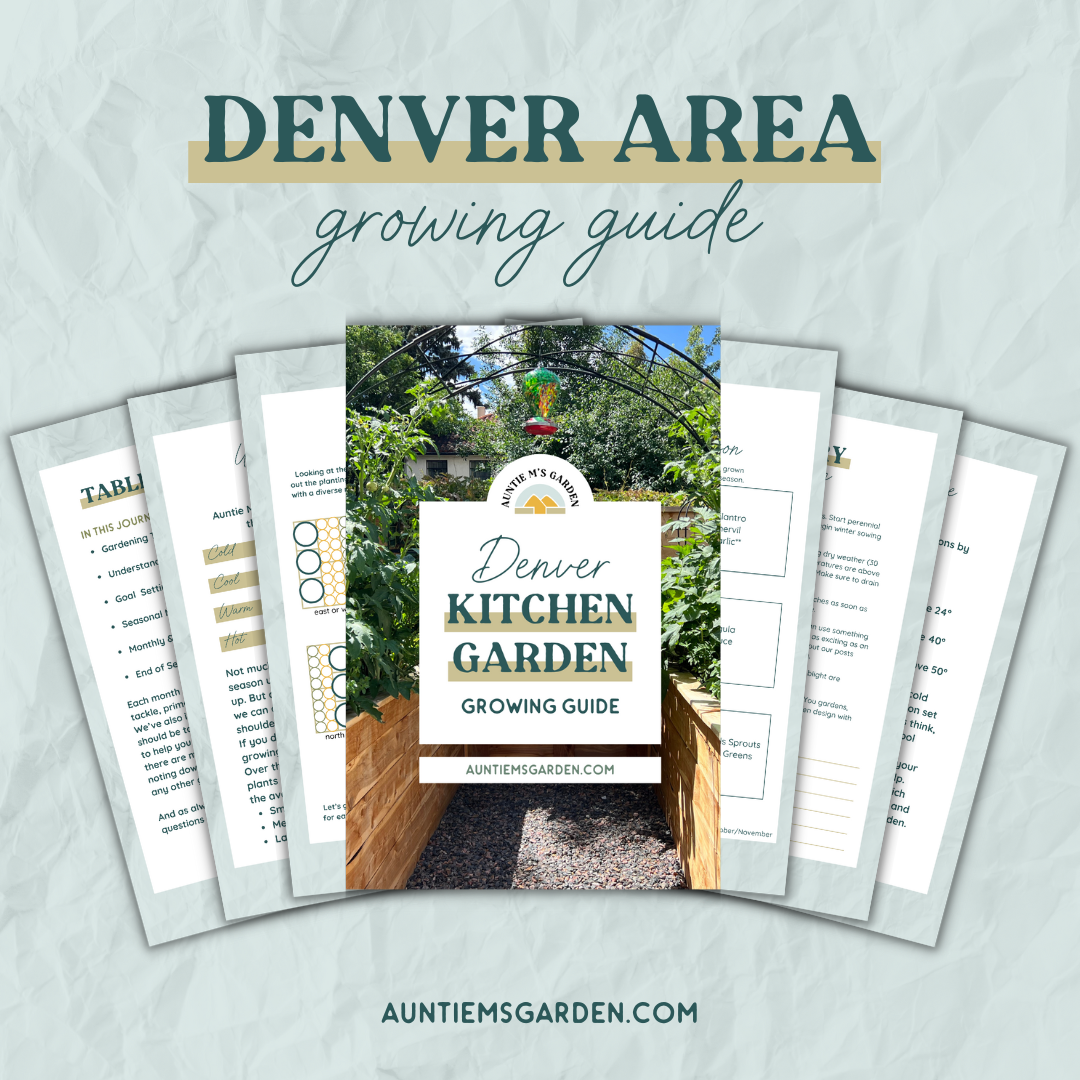Gardening as an Act of Rebellion: Why Growing Your Own Food Is More Powerful Than You Think
In a world that feels unpredictable, there’s something undeniably powerful about planting a seed, tending to it with care, and harvesting food straight from your own backyard. It’s more than just a hobby—it’s an act of self-sufficiency, sustainability, and, yes, rebellion.
When you grow your own food, you’re taking control of what’s on your plate, reducing dependence on fragile food systems, and making a tangible impact on your local environment. And for Denver gardeners, where we battle unpredictable weather, dry conditions, and the ever-present challenge of growing in high-altitude soil, gardening is even more of a revolutionary act.
If you’ve ever felt overwhelmed by the world’s uncertainty, let me remind you: getting your hands in the dirt is one of the most grounding things you can do.
Here’s why growing your own food is a quiet but radical act—and why more people should be doing it.
1. Growing Your Own Food is Self-Sufficiency in Action
Get our Denver Growing Guide now!
The modern food system is built on convenience—but that convenience comes at a cost. Long supply chains, reliance on imported produce, and unexpected shortages have made grocery shopping more unpredictable than ever.
When you grow your own food, you take back control over where your food comes from.
For Denver gardeners, this means choosing crops that thrive in our unique climate—cold-hardy greens in the spring, drought-tolerant herbs in the summer, and a bounty of root vegetables for fall harvests. It means knowing that when supply chains falter, your backyard garden can still provide nourishment.
🪴Self-Sufficiency Tip:
Start with easy-to-grow crops that don’t require a ton of water or fuss—think leafy greens, radishes, garlic, and herbs like thyme and oregano. Not only are they resilient in our Denver climate, but they’ll also give you a quick win when you’re just getting started.
2. Gardening is an Environmental Rebellion Against Waste
Industrial agriculture isn’t just unsustainable—it’s wasteful. Between excessive water use, harmful pesticides, and the staggering amount of food waste in landfills, the environmental cost of our current food system is undeniable.
But when you garden? You’re flipping the script.
💧 You use less water.
Growing food at home, especially with water-wise techniques like drip irrigation and mulching, means you’re using a fraction of the water compared to large-scale agriculture.
♻️ You create less waste.
No plastic packaging, no food miles, no unnecessary waste—just fresh, homegrown produce straight from the soil to your plate.
🌿 You improve the soil instead of depleting it.
Industrial farming strips soil of nutrients, but home gardeners build soil health through composting, cover cropping, and regenerative gardening practices.
🪴Water-Wise Tip for Denver Gardeners:
Use rain barrels to capture water when it’s available (yes, they’re legal in Colorado!), and layer your soil with mulch to retain moisture. Xeriscaping principles work for edible gardening, too!
3. Gardening is a Mental Health Lifeline
Let’s be honest—the world can feel chaotic. But when you step into the garden, everything slows down. You move at the pace of nature. You breathe a little deeper. You reconnect with something real.
Studies have shown that gardening reduces stress, lowers anxiety, and even boosts dopamine levels—and if you’ve ever spent an afternoon tending to your plants, you know exactly why. The simple act of watching something grow, caring for it daily, and finally harvesting what you planted? It’s a reminder that, despite everything, you have the power to create something good.
🪴Self-Care Tip:
Take five minutes each day to check in with your garden. Notice what’s growing, what’s struggling, and how things are changing. It’s not just about tending to plants—it’s about tending to yourself, too.
4. Gardening Builds Community in a Time of Disconnection
If there’s one thing I’ve learned over the years, it’s that gardening is never just about the plants—it’s about the people who grow them. Sharing seeds, swapping homegrown veggies, teaching a neighbor how to start their first garden—these small acts of connection make a big difference.
In a time when people are craving real connection, gardening gives us a way to build relationships in our own backyards. Whether it’s through a community garden, a seed swap, or just gifting extra zucchini to a friend, gardening strengthens community bonds in a way few other things can.
Get our Denver Growing Guide now!
🪴Community Tip:
If you have extra produce, don’t let it go to waste! Share it with a neighbor, donate it to a local food bank, or offer it up in a community fridge. Gardening isn’t just about growing food—it’s about growing generosity, too.
5. Gardening is Hope in Action
When things feel uncertain, it’s easy to feel powerless. But every time you plant a seed, you’re making a declaration of hope. You’re investing in the future, in something that will grow and flourish despite challenges.
And for Denver gardeners, where we deal with late frosts, sudden hailstorms, and scorching summer heat, growing food is an act of resilience. It’s a commitment to adapting, learning, and working with nature instead of against it.
Ready to Start Your Own Gardening Rebellion?
If you’ve ever thought about growing your own food, now is the time. Whether you’re starting small with a few pots of herbs or planning a full backyard transformation, the first step is just getting started.
🌱 Want to learn exactly what to grow (and when) in Denver?
Check out our Denver Growing Guide for in-depth advice, planting tips, and planning strategies! Let’s start planning your best garden yet.
🌱 Need help designing a garden that works for YOU?
We offer consultations, custom garden and landscape designs, and maintenance packages. Sign up for a consultation today and let’s create a space that nurtures both your plants and your well-being.
Have questions or want to share your gardening success stories?
Drop a comment below, or reach out through our Contact Page!
Check out our free resources or services!
Save this Blog on Pinterest!
**This post may contain affiliate links, which means I earn a small profit if you click on the link to make a purchase. Other links are not sponsored, because I also like supporting small, local businesses.**
Meet the Gardener
I’m Elisa Mack - a mom and Denverite who went from being a green-ish thumb to a kitchen garden fanatic simply by dedicating myself to the study of all things Colorado gardening.
Landscapers don’t design. And nurseries don’t make house calls.
We take a more full-service approach, from designing your dream garden to keeping it beautiful year-round.
And as your coach, I’ll help eliminate the guesswork through every season, no matter your level of knowledge.













